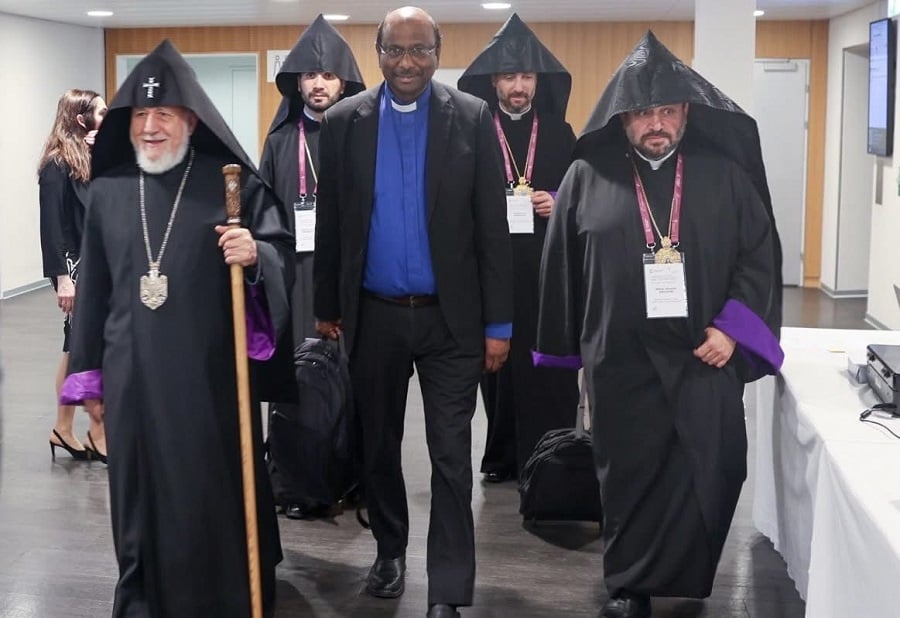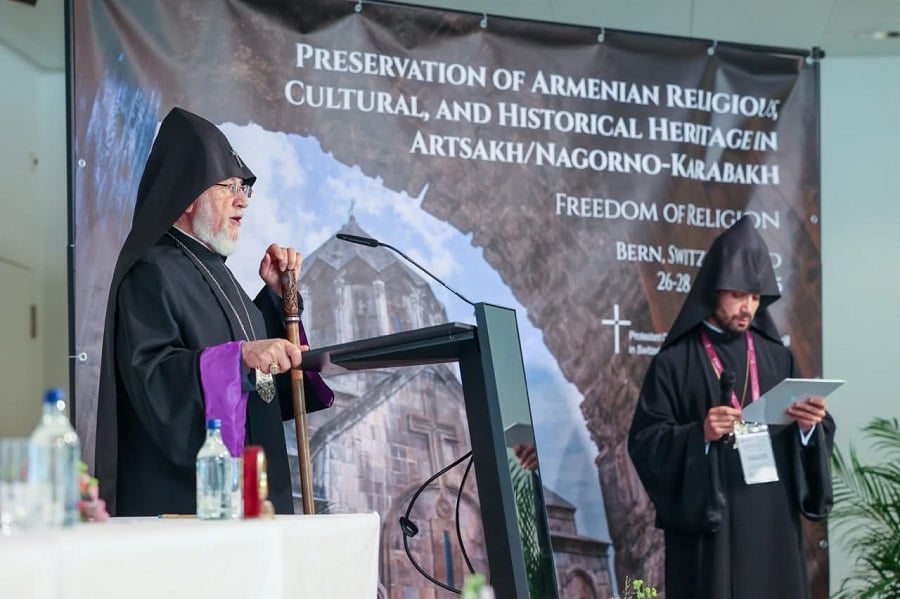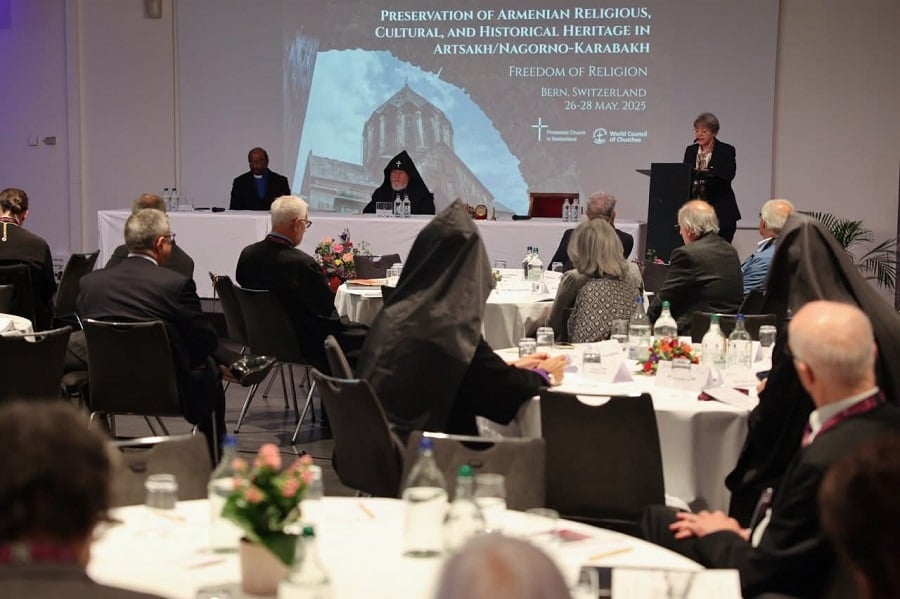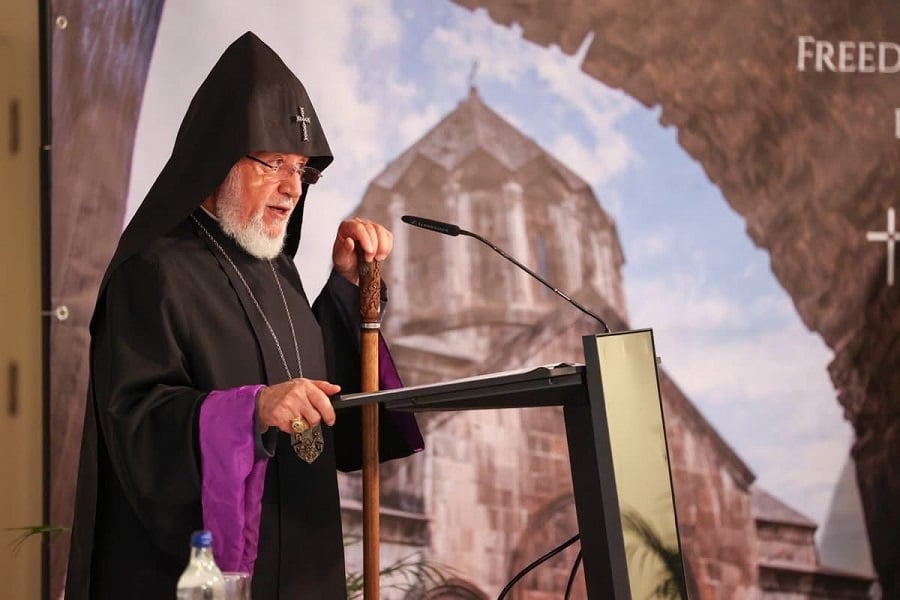At the initiative of His Holiness Karekin II, Supreme Patriarch and Catholicos of All Armenians, an international conference titled “Religious Freedom: Preserving the Armenian Spiritual, Cultural, and Historical Heritage in Artsakh/Nagorno-Karabakh” is held in Bern, Switzerland, from May 26 to 28. The event was organized by the World Council of Churches (WCC) and the Protestant Church of Switzerland.
On May 27, the conference opened with the blessing and message of His Holiness the Catholicos of All Armenians.
His Holiness expressed his gratitude to Rev. Dr. Jerry Pillay, General Secretary of the World Council of Churches; Rev. Rita Famos, President of the Protestant Church of Switzerland; the members of the WCC governing body; and the organizers and supporters of the conference—thanks to whose efforts, once again, the challenges faced by the Armenian people in the aftermath of the occupation of Artsakh/Nagorno-Karabakh are being raised on the international stage.
“In the 21st century—a time that should have been marked in the life of nations and states by the triumph of peace, solidarity, and justice—we are, tragically, witnessing genocidal acts and ethnic cleansing fueled by war, hatred, and enmity, as well as deplorable violations of religious freedom and fundamental human rights. Our people, too, have endured such calamities as a result of Azerbaijan’s aggression and atrocities against Artsakh, carried out with the military support of Turkey.
Read also
During the 44-day war unleashed in 2020 and the large-scale military operations of 2023, Artsakh was occupied and entirely emptied of its Armenian population. Significant and strategically vital territories along the borders of the Republic of Armenia have also been seized, and new demands continue to be imposed in the course of ongoing peace treaty negotiations.
Azerbaijan continues to hold the political leadership, civilians, and prisoners of war of Artsakh as hostages, subjecting them to show trials and fabricated charges, in gross violation of international legal norms. These unlawful acts and degrading cruelties are motivated by ethnic hatred and anti-Armenian sentiment—the same animus that underlies the assaults on Armenian spiritual and cultural heritage, and sacred historical sites,” stated the Catholicos of All Armenians.
He emphasized that for centuries, the Armenians of Artsakh—steadfast in their devotion to their homeland, faith, and national identity—lived with dignity, contributing richly to the heritage of global culture through their accomplishments in education and the arts.”
His Holiness sorrowfully noted that since the occupation of Artsakh, Azerbaijan’s barbaric destruction of Armenian monuments, Christian shrines, settlements, and cemeteries has continued unabated.
Pursuing a policy to erase Armenian identity, Azerbaijan is cunningly reclassifying the historic Armenian monasteries and churches of Artsakh as “Albanian” heritage.
“The Azerbaijani authorities persistently ignore international appeals. They have refused to comply with the European Parliament’s 2022 Resolution No. 2582 on the destruction of cultural heritage in Nagorno-Karabakh and rejected UNESCO’s initiative for a fact-finding mission to assess the condition of Armenian heritage sites in Artsakh.
Complicit in Azerbaijan’s anti-Armenian propaganda is Sheikh-ul-Islam Allahshukur Pashazade, head of the Caucasus Muslim Board, who recently issued false and slanderous statements,” added the Catholicos, recalling that this same pattern of hatred led to the destruction of Armenian holy sites in Nakhijevan and, exactly twenty years ago—in 2005—the total demolition of some six thousand monument cross-stones (khachkars) in Old Jugha.
“Cultural crimes, tragically, recognize no geographical boundaries. They occur wherever human and national rights are violated, where xenophobia and intolerance prevail, and where the noble value and significance of spiritual heritage are disregarded. Assaults on cultural heritage are rightly regarded not merely as offenses against a single nation but as crimes against universal human values.
The impunity for such barbaric acts fosters a climate of lawlessness—not only enabling Azerbaijan to persist in its campaign of cultural destruction, but also setting a dangerous precedent that may encourage similar or even more grievous crimes elsewhere in the world,” stated the Catholicos of All Armenians.
He affirmed that the protection of cultural values is not only a sacred duty for all but also an essential commitment to preserving the history, faith, and identity of nations and peoples.
Addressing the participants of the conference, His Holiness emphasized: “Today, more than ever, the protection of the spiritual, cultural, and historical heritage of Artsakh is an urgent priority.
The forcibly displaced people of Artsakh have been deprived of the right to live and create on their native land, and to safeguard and develop the culture they built through faith over centuries.
Such horrifying assaults on humanity and human dignity, which strike at the heart of freedom, justice, and the rule of law, must not be tolerated in our modern world. Yes, conflicts between nations must be resolved peacefully, through justice, mutual understanding, and in full respect for national identity and human dignity.
Highlighting the vital importance of such conferences, the Catholicos expressed hope that the international community and relevant institutions will take effective measures to preserve the spiritual and cultural heritage of Artsakh, ensure the safe return of the Armenians to their ancestral homeland, restore their rightful freedom and dignity, and secure the swift release of Armenian captives.
In conclusion, His Holiness extended his gratitude to the sister Churches and ecumenical organizations for their steadfast support of the Armenian people and the Church during this difficult time, as well as for their unwavering commitment to defending the rights of the Armenians of Artsakh, wishing the conference fruitful deliberations.





























































